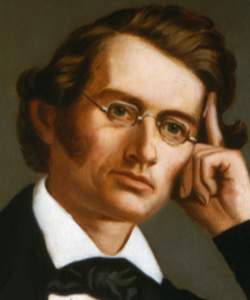Robert Emory (Dickinson Chronicles)
Scholarship
Robert Emory was born in 1814 to Bishop John Emory and his wife. The elder Emory had served as president of the Dickinson College Board of Trustees from 1833 to 1835, and is the namesake of both Emory University in Georgia and Emory and Henry College in Virginia. The younger Emory attended Columbia University and graduated at the top of his class in 1831. He then studied law under Reverend Johnson in Baltimore. In 1836, Emory joined the faculty of Dickinson as professor of Latin and Greek at the Grammar School. He remained at this post until 1840 when he resigned in order to work in the ministry. During President Durbin's trip abroad in 1842 and 1843, Emory returned to Carlisle to serve as Dickinson's acting president; with Durbin’s return, Emory resumed his work in the ministry. Within two years, Durbin resigned, and Emory again was chosen to lead the College.
During Emory’s presidency he brought about several significant advances in policy. He improved the modern language program by introducing the first elective classes into the curriculum; juniors could choose between Greek and German and seniors could choose between Mathematics and French. In addition, the library, laboratory, and museum were all moved together into South College. Classes for both the Grammar School and the College were to be held in the same buildings, with the teaching load to be shared among the school and college faculties. Also under Emory, an old utility building was refurbished for use by student artisans. Several needier students were able to live within the building, deemed North College, as well as have a space to ply their trades on the premises. Despite all of these changes, Emory's presidency would prove to be quite short.
Suffering from chronic health problems, most particularly tuberculosis, Emory attempted to resign in 1847. The Board of Trustees refused to accept his resignation, encouraging him instead to take a leave of absence and granting him permission to do so. He traveled to London to attend the Evangelical Alliance Convention in hopes of regaining his health, but shortly after his return, on May 18, 1848, Robert Emory died in Baltimore. He was thirty-four years old.
During Emory’s presidency he brought about several significant advances in policy. He improved the modern language program by introducing the first elective classes into the curriculum; juniors could choose between Greek and German and seniors could choose between Mathematics and French. In addition, the library, laboratory, and museum were all moved together into South College. Classes for both the Grammar School and the College were to be held in the same buildings, with the teaching load to be shared among the school and college faculties. Also under Emory, an old utility building was refurbished for use by student artisans. Several needier students were able to live within the building, deemed North College, as well as have a space to ply their trades on the premises. Despite all of these changes, Emory's presidency would prove to be quite short.
Suffering from chronic health problems, most particularly tuberculosis, Emory attempted to resign in 1847. The Board of Trustees refused to accept his resignation, encouraging him instead to take a leave of absence and granting him permission to do so. He traveled to London to attend the Evangelical Alliance Convention in hopes of regaining his health, but shortly after his return, on May 18, 1848, Robert Emory died in Baltimore. He was thirty-four years old.
John Osborne and James W. Gerencser, eds., “Robert Emory,” Dickinson Chronicles, http://chronicles.dickinson.edu/encyclo/e/ed_emoryR.html.



